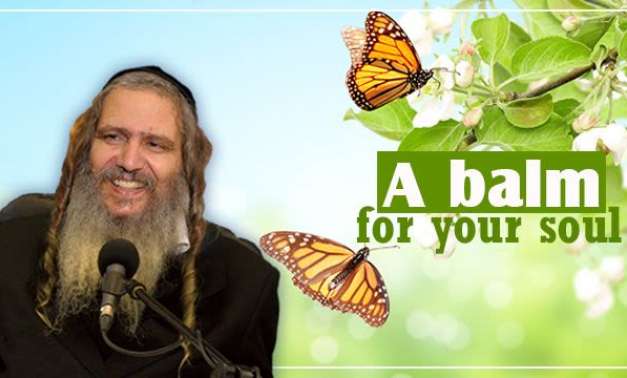
Overcoming Paranoia
Emuna and paranoia just don’t go together. With emuna, nothing in the world can scare you; all the perceived threats simply evaporaye into nothingness…

Translated by Rabbi Lazer Brody
Every one of us is paranoid to a certain extent, depending on how blemished our emuna is. Paranoia is a thought process characterized by excessive fear and  anxiety, often to the point of irrationality or even delusion. A paranoid constantly perceives threats towards himself. Just think of things we ask and say to ourselves every single day:
anxiety, often to the point of irrationality or even delusion. A paranoid constantly perceives threats towards himself. Just think of things we ask and say to ourselves every single day:
 anxiety, often to the point of irrationality or even delusion. A paranoid constantly perceives threats towards himself. Just think of things we ask and say to ourselves every single day:
anxiety, often to the point of irrationality or even delusion. A paranoid constantly perceives threats towards himself. Just think of things we ask and say to ourselves every single day: “Why didn’t this person smile at me? He probably hates me!”
“Why does the boss treat my coworker better than he treats me? He probably wants to fire me!”
“Why does my wife talk about her brother so much? She probably has no regard for me…”
The common denominator of perceived threats – that once again are manifestations of paranoia – is that they all stem from a lack of emuna. Even if a person is the most insignificant human on earth, if he has emuna, he won’t be threatened by anybody. No one can intimidate a person that clings to Hashem with emuna; with emuna, we know ein od milvado – there is no one or nothing but Hashem! Everything comes from Hashem. Emuna melts away fear and anxiety. In that respect, emuna and paranoia are mutually exclusive – if you have one, you don’t have the other. In that respect, as soon as we feel threatened by anything or anyone, then we should review “The Garden of Emuna” and strengthen ourselves in emuna.
Going down the list, we see that all worries, fears, and anxiety are all expressions of blemished or inadequate emuna. With emuna, a person doesn’t worry about losing his health or losing his money. He knows that whatever Hashem does is for the very best. Not only that, with emuna, a person knows that there’s no such thing as bad; whatever seems bad is really for the ultimate good. The person with emuna is therefore capable of thanking Hashem for everything that happens to him, because he knows that everything comes from Hashem in precise tailor-made Divine Providence for that person’s own good. In that respect, he has a sincere smile on his face all day long, not only when things are going the way he wants them to.
We can go down the list of emotional disorders one by one in the same fashion. Rebbe Natan of Breslev once gave a lecture, and a mentally deranged person walked in the room then walked out. Rebbe Natan said, “We’re all like him – there’s not a single one of us that’s normal. It’s lucky that we’re all connected to a normal person who leads us – that’s Rebbe Nachman!” Rebbe Natan was conveying three messages: first, the true tzaddik has perfect emuna; second, we all have deficiencies in our emuna that we need to correct; and three, any lack of emuna is tantamount to a lack of sanity. In fact, Rebbe Natan says explicitly that emotional deficiencies stem from a lack of emuna, and in order to live a good, emotionally-healthy life in this world, one must know that everything that happens in the world comes from Hashem and is for the very best.
Rabbenu Nachman says, “Life is unbearable for a person who lacks emuna.” These nine words are the key to mental and emotional wellbeing, or the opposite, heaven forbid. A woman once came to me with a complaint. Years ago, her neighbor insulted her. No matter how hard she tries, she can’t forgive the neighbor. The situation was making her so sick that she forced her husband to sell their house and move elsewhere. The move cost them thousands of dollars. Even though she now lives on the other end of town, she still thinks about the neighbor from time to time, and every time she does, it drives her crazy.
I explained to this woman that her problem was twofold: first, since she attributed her tribulations to her neighbor and not to Hashem, she completely missed Hashem’s message and failed the test of emuna. Second, since she hasn’t corrected the root cause that brought about the humiliation in the first place, she still suffers every time she is reminded of the neighbor.
Subsequently, I taught the woman how to approach the matter in personal prayer: “Hashem, please illuminate my heart and help me realize what I did wrong to invoke that humiliating episode. I know that You are a loving Father, and it hurts You to torment Your children. So, if You have caused me to suffer, there must be a very good reason. Please help me make teshuva for whatever I did wrong, so I can be at peace with You, with my fellow human, and with myself.”
This type of personal prayer enhances emuna and keeps a person emotionally healthy, for he is freed of hate, revenge, and all the other negative feelings that eat away at a person’s heart just like acid. In that respect, emuna also prevents a long list of physical ailments such as cardiac arrests, strokes, and ulcers. If you know someone that’s recovering from a heart attack, the best thing he could do to insure a complete recovery and future good health is to eat healthy foods, walk for an hour a day, and strengthen his emuna. Emuna prevents future wear and tear of the heart and brain.
Any sorrow that a person has in life stems from a lack of emuna. Emuna means that everything is for the best. So, if we feel sorrow about anything, it’s a lack of emuna on our part. Let’s return to the woman that suffered the humiliation. She should be thanking Hashem for a half hour a day for having received that humiliation. She should also being doing teshuva for having complained so many years about how the neighbor humiliated her. First of all, it wasn’t the neighbor, it was Hashem. Second of all, it was all for the very best. Hashem oftentimes substitutes a serious verdict and punishment for some light-weight atonement such as insult or embarrassment, that doesn’t cause damage to our bodies or to our livelihood. What could be a greater loving kindness? Would a heart attack be preferable to a bit of insult? Or bankruptcy? When we look at what Hashem does through eyes of emuna, we want to sing, dance, and thank him all day long.
If a person makes teshuva for lack of emuna, and then thanks Hashem for all his difficulties in life, he won’t feel any more sorrow at all. Not only that, when a person makes teshuva and thanks Hashem during a daily hour of personal prayer, he stands on the spiritual level of a tzaddik, and he invokes Divine compassion and abundance for the whole world.







8/06/2009
Question It’s easy to talk about emuna. But really we are not rational creatures. Without intense torah study, the animal side of us will overpower all logical arguments and drag us into passion and anger. would greatly appreciate your thoughts on this.
8/06/2009
It’s easy to talk about emuna. But really we are not rational creatures. Without intense torah study, the animal side of us will overpower all logical arguments and drag us into passion and anger. would greatly appreciate your thoughts on this.